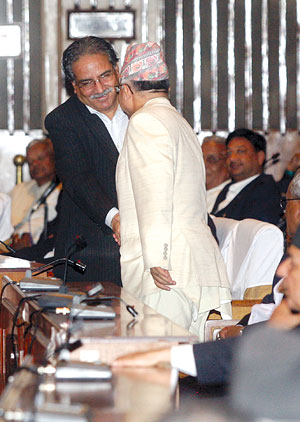 KIRAN PANDAY |
The Nepali people's message to the political leadership of this country in the 2008 elections was clear: we want the Maoists to transform themselves into a legitimate political party and work with the other parties to write a new constitution. But the leaders forgot this mandate, and their priority was not the constitution but political power.
As the CA's term neared its expiry date, this newspaper carried out a public opinion poll in which an overwhelming number of the over 5,000 respondents from all over the country said that if the constitution couldn't be written on time, the CA's term should be extended and a national consensus government formed. Politics becomes cynical when public opinion ceases to matter to politicians.
The last minute deal last week didn't just save the CA, it also saved the country's two biggest communist parties (the Maoists and the UML) both from splitting right down the middle. The cracks had begun to appear last year, but on the morning of 28 May, a Maoist Standing Committee meeting was divided between the Baburam Bhattarai camp (which wanted a six-month extension of the CA) and the Baidya faction (which didn't want an extension). Chairman Pushpa Kamal Dahal cast his lot with the hardliners.
Similarly, by evening dissidents within the UML, led by Bam Dev Gautam, had started a signature campaign to get 62 members to call for the resignation of the prime minister, though he was from their own party. Meanwhile, the MJF and other Madhesi parties in government began to say that the prime minister should step down, the CA term should be extended and the Maoists should lead a new national government. For the Madhesi parties, this was a complete turnaround.
A week later, as the Maoists and the NC-UML coalition interpret the three-point resolution in their own way and the political rhetoric goes back to pointing fingers, it looks like nothing has changed. The parties have just bought time by extending the CA. When should the prime minister resign, if at all, and who should take his place?
The person most desperate to get back to Baluwatar is Chairman Dahal, but he has too many external and internal forces arrayed against him.
Baburam Bhattarai could be the compromise candidate for the other parties, but the paradox is that his own party leadership, especially Dahal, is against him.
Some within the NC are now saying it is their 'turn' and are promoting Ram Chandra Poudel for his leadership in striking the deal last week. Sher Bahadur Deuba's critics say he has been prime minister once too often and he may have to wait till the NC convention to lead his party.
Jhalnath Khanal has too many enemies within the UML who don't trust what they see as his duplicitous role in dealing with the Maoists. KP Oli has represented the right wing of his leftist party, but it was his last-minute turnaround on Thursday in a meeting with Dahal that allowed a deal to be struck. Still, he is hobbled with the same 'loser' label that has undermined Madhav Nepal's credibility.
The CA has been revived with a magic wand. The agreement itself is vague and there is no timeline. After the drama of last week, we are back to where we started: getting a power-sharing agreement on a national government so that the other peace and constitutional issues can fall into place.
READ ALSO:Resurrection, deconstructed, Prashant Jha
Complicity journalism, CK Lal
Revisiting Crapmandu, Rabi Thapa
Professionalism and transparency, Artha Beed
M�nage � trois, Ass



